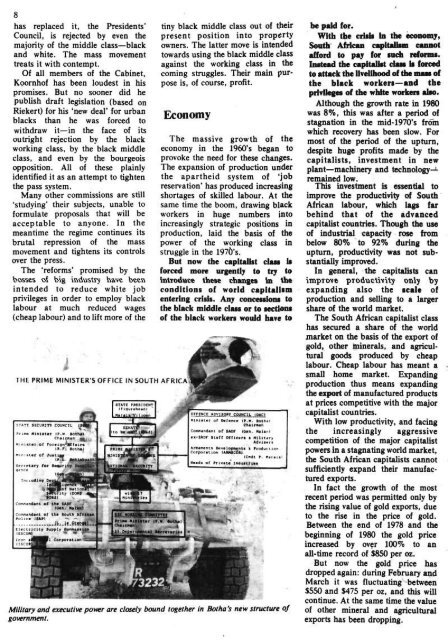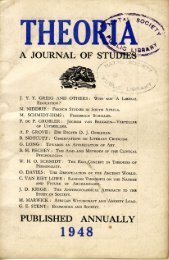Inqaba ya basebenzi Number 2 April 1981 - DISA
Inqaba ya basebenzi Number 2 April 1981 - DISA
Inqaba ya basebenzi Number 2 April 1981 - DISA
Create successful ePaper yourself
Turn your PDF publications into a flip-book with our unique Google optimized e-Paper software.
8<br />
has replaced it, the Presidents'<br />
Council, is rejected by even the<br />
majority of the middle class—black<br />
and white. The mass movement<br />
treats it with contempt.<br />
Of all members of the Cabinet,<br />
Koornhof has been loudest in his<br />
promises. But no sooner did he<br />
publish draft legislation (based on<br />
Riekert) for his 'new deal' for urban<br />
blacks than he was forced to<br />
withdraw it—in the face of its<br />
outright rejection by the black<br />
working class, by the black middle<br />
class, and even by the bourgeois<br />
opposition. All of these plainly<br />
identified it as an attempt to tighten<br />
the pass system.<br />
Many other commissions are still<br />
'studying' their subjects, unable to<br />
formulate proposals that will be<br />
acceptable to anyone. In the<br />
meantime the regime continues its<br />
brutal repression of the mass<br />
movement and tightens its controls<br />
over the press.<br />
The 'reforms' promised by the<br />
bosses of big industry have been<br />
intended to reduce white job<br />
privileges in order to employ black<br />
labour at much reduced wages<br />
(cheap labour) and to lift more of the<br />
tiny black middle class out of their<br />
present position into property<br />
owners. The latter move is intended<br />
towards using the black middle class<br />
against the working class in the<br />
coming struggles. Their main purpose<br />
is, of course, profit.<br />
Economy<br />
The massive growth of the<br />
economy in the 1960's began to<br />
provoke the need for these changes.<br />
The expansion of production under<br />
the apartheid system of 'job<br />
reservation' has produced increasing<br />
shortages of skilled labour. At the<br />
same time the boom, drawing black<br />
workers in huge numbers into<br />
increasingly strategic positions in<br />
production, laid the basis of the<br />
power of the working class in<br />
struggle in the 1970's.<br />
But now the capitalist class U<br />
forced more urgently to try to<br />
Introduce these changes In the<br />
condition! of world capitalism<br />
entering crisis. Any concession! to<br />
the black middle class or to sections<br />
of the black workers would have to<br />
Military and executive power are closely bound together in Botha's new structure of<br />
government.<br />
be paid for.<br />
With the crisis In the economy,<br />
South African capitalism cannot<br />
afford to pay for such reforms.<br />
Instead the capitalist class is forced<br />
to attack the livelihood of the mass of<br />
the black workers—and the<br />
privileges of the white workers also.<br />
Although the growth rate in 1980<br />
was 8%, this was after a period of<br />
stagnation in the mid-1970's from<br />
which recovery has been slow. For<br />
most of the period of the upturn,<br />
despite huge profits made by the<br />
capitalists, investment in new<br />
plant—machinery and technology—<br />
remained low.<br />
This investment is essential to<br />
improve the productivity of South<br />
African labour, which lags far<br />
behind that of the advanced<br />
capitalist countries. Though the use<br />
of industrial capacity rose from<br />
below 80% to 92% during the<br />
upturn, productivity was not substantially<br />
improved.<br />
In general, the capitalists can<br />
improve productivity only by<br />
expanding also the scale of<br />
production and selling to a larger<br />
share of the world market.<br />
The South African capitalist class<br />
has secured a share of the world<br />
market on the basis of the export of<br />
gold, other minerals, and agricultural<br />
goods produced by cheap<br />
labour. Cheap labour has meant a<br />
small home market. Expanding<br />
production thus means expanding<br />
the export of manufactured products<br />
at prices competitive with the major<br />
capitalist countries.<br />
With low productivity, and facing<br />
the increasingly aggressive<br />
competition of the major capitalist<br />
powers in a stagnating world market,<br />
the South African capitalists cannot<br />
sufficiently expand their manufactured<br />
exports.<br />
In fact the growth of the most<br />
recent period was permitted only by<br />
the rising value of gold exports, due<br />
to the rise in the price of gold.<br />
Between the end of 1978 and the<br />
beginning of 1980 the gold price<br />
increased by over 100% to an<br />
all-time record of $850 per oz.<br />
But now the gold price has<br />
dropped again: during February and<br />
March it was fluctuating between<br />
$550 and $475 per oz, and this will<br />
continue. At the same time the value<br />
of other mineral and agricultural<br />
exports has been dropping.
















